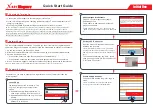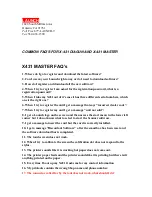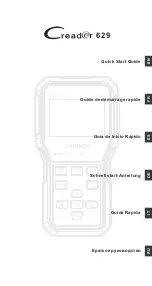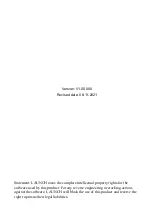
9
Order No. 38.0230
BEAM-4/RGBW
Installation
Remove all packing materials from the
BEAM-4/
RGBW. Check if all foam and plastic padding is
removed. Connect all cables.
Do not supply power before the whole system is set up and connected properly.
Always disconnect from electric mains power supply before cleaning or servicing.
Damages caused by non-observance are not subject to warranty.
Set Up and Operation
Follow the directions below, as they pertain to your preferred operation mode.
Before plugging the unit in, always make sure that the power supply matches the product specification
voltage. Do not attempt to operate a 120V specification product on 230V power, or vice versa.
Connect the device to the main power supply. The device can be sound-controlled as it is equipped
with a built-in microphone.
Control Modes
There are 5 modes:
•
Stand-alone (Auto)
•
Manual
•
Sound-controlled
•
Master/Slave
•
DMX-512 (1, 22, 26CH)
One
BEAM-4/RGBW
(Auto and Manual)
01)
Fasten the effect light to a firm trussing. Leave at least 0,5 meter on all sides for air circulation.
02)
Plug the end of the electric mains power cord into a proper electric power supply socket.
03)
When the
BEAM-4/RGBW
is not connected with a DMX cable, it functions as a stand-alone device.
Please see pages 16-18 for more information about the Auto Mode and Manual Mode.
One
BEAM-4/RGBW
(Sound-controlled)
01)
Fasten the effect light to a firm trussing. Leave at least 0,5 meter on all sides for air circulation.
02)
Plug the end of the electric mains power cord into a proper electric power supply socket.
03)
Turn on the music. If the device is set to sound-control, then the
BEAM-4/RGBW
will react to the beat
of t
he music. Please see page 18 for more information about the sound-control options.
Multiple
BEAM-4/RGBW
s (Master/Slave control)
01)
Fasten the effect light onto firm trussing. Leave at least 0,5 meter on all sides for air circulation.
02)
Use a 3-pin XLR cable to connect the
BEAM-4/RGBW
.
The pins:
01)
Earth
02)
Signal -
03)
Signal +
03)
Link the units as shown in fig. 04. Connect the first unit's DMX "out" socket with the second unit's "in"
socket, using a DMX-signal cable. Repeat this process to link the second, third, and fourth units.
You can use the same functions on the master device as described on page 18 (Auto Mode or
Sound-controlled Mode). This means that you can set your desired operation mode on the master
device and all slave devices will react the same as the master device.










































